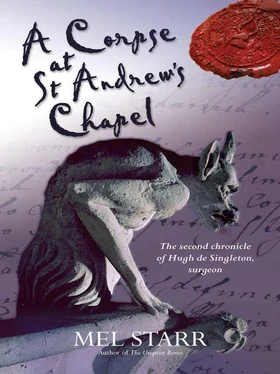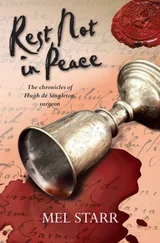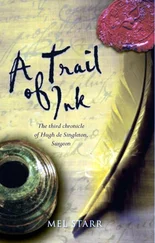Mel Starr - A Corpse at St Andrew's Chapel
Здесь есть возможность читать онлайн «Mel Starr - A Corpse at St Andrew's Chapel» весь текст электронной книги совершенно бесплатно (целиком полную версию без сокращений). В некоторых случаях можно слушать аудио, скачать через торрент в формате fb2 и присутствует краткое содержание. Год выпуска: 2010, Издательство: Kregel Publications, Жанр: Исторический детектив, на английском языке. Описание произведения, (предисловие) а так же отзывы посетителей доступны на портале библиотеки ЛибКат.
- Название:A Corpse at St Andrew's Chapel
- Автор:
- Издательство:Kregel Publications
- Жанр:
- Год:2010
- ISBN:нет данных
- Рейтинг книги:5 / 5. Голосов: 1
-
Избранное:Добавить в избранное
- Отзывы:
-
Ваша оценка:
- 100
- 1
- 2
- 3
- 4
- 5
A Corpse at St Andrew's Chapel: краткое содержание, описание и аннотация
Предлагаем к чтению аннотацию, описание, краткое содержание или предисловие (зависит от того, что написал сам автор книги «A Corpse at St Andrew's Chapel»). Если вы не нашли необходимую информацию о книге — напишите в комментариях, мы постараемся отыскать её.
A Corpse at St Andrew's Chapel — читать онлайн бесплатно полную книгу (весь текст) целиком
Ниже представлен текст книги, разбитый по страницам. Система сохранения места последней прочитанной страницы, позволяет с удобством читать онлайн бесплатно книгу «A Corpse at St Andrew's Chapel», без необходимости каждый раз заново искать на чём Вы остановились. Поставьте закладку, и сможете в любой момент перейти на страницу, на которой закончили чтение.
Интервал:
Закладка:
“Master Wyclif’s theology is useful for statecraft?” Kate concluded.
“Aye. Today. What may be tomorrow or next year no man can know.”
“He may fall from favor?”
“He may…when he is useful no more.”
“When will that be?”
“When we no longer quarrel with the French, and the pope is no longer at Avignon, I think.”
“Ah,” Kate laughed. “Then Master Wyclif will find friends at court for many years.”
“You know much of the affairs of kings and ministers.”
“I do but keep my ears open and my mouth closed,” Kate replied. “So those who have opinions speak them before me, thinking I am witless and will understand nothing. ’Tis common for students to think so…of a lass.”
“Not all young men are so disposed. My mother was a wise woman. My father sought her advice often, and I and my brothers saw.”
“And did she offer counsel even when he did not ask?”
“That, too. But she was no termagant.”
“How many brothers have you?”
Our conversation, which began with hesitancy, flowed from politics to family. I learned that her mother had died when Kate was five years old. She had but little memory of her. Her mother and the child had died at the birth of a younger brother. Her grandfather was a stationer in Cambridge, and rather than wait to inherit the shop there, her father had decided to remove to Oxford and open his own business. He had talked to Baliol scholars and knew the crusty reputation which Aelfred had built for himself.
I told Kate of growing up the youngest of four sons at the manor of Little Singleton, in Lancashire. I told her of netting eels from the Wyre, and watching plague strike my family. I told her of the return of plague four years past, and how the disease had provided the book which sent me to Paris and gave me a profession.
“And now you have a murderer and a poacher to apprehend,” Kate added. “I heard your conversation with father while I prepared dinner.”
I was reminded that, while I was sated, Kate had taken no dinner, but served me and her father. I was reluctant to leave, but if I was to present to Master John the matter of Thomas atte Bridge and his nocturnal visit to John Kellet, I must be away. And my departure would allow Kate to take some of the meal she had prepared but so far not enjoyed.
Robert Caxton’s customer was no longer present. I found the stationer reading at his desk when I passed through the door from the work room. He had surely overheard the conversation between his daughter and me, but had chosen to take no part in it.
There followed many thanks: I to Kate and her father for the meal, they to me for treating Caxton’s wounded back. As I took the shop door latch in hand I turned to ask if I might call when next I was in Oxford. Of course, a man may call at a place of business any time he will without asking, and be welcome for his trade. But I wanted both father and daughter to know that business would not be my reason — at least, not my only reason — to visit Holywell Street when next I traveled to Oxford. These words I did not have opportunity to say. Kate spoke first.
“Master Hugh,” she said softly, as I turned from the door, “I will take it amiss should you visit Oxford some future day and do not call.”
Behind Kate, over her shoulder, I saw her father nod agreement. I promised that I would be obedient to the girl’s command, said a last farewell, and set off down Holywell Street with a heavy stomach and light heart.
Oxford’s streets were crowded. Black-gowned students, set free from study until the new term, elbowed each other through streets and lanes. Late buyers patronized shops before closing. I was become accustomed to the bucolic life of Bampton, but plunging into the noise and smells of Oxford’s streets brought pleasant memories; memories of days when as a student I was concerned only with books and studies and enjoying the life of a fledgling scholar. Days when I had no murders to concern me or poachers to apprehend.
The porter at New Canterbury Hall recognized me. I was admitted with a smile and a tug of his forelock. He had no great esteem for me, I am sure. But I was a friend of the warden. That made me a man of consequence. If a man cannot achieve fame of his own merit, the next most rewarding thing is to be recognized as a friend of the famous and powerful. As if renown might slough off with recognition.
Master John’s life turned about study and teaching. Since classes for the term were ended, I thought I might find him in his chamber bent over some tome. So he was.
I saw him through the small window which looked out from his room to the cloister. If he noted my shadow pass he did not think it important enough to raise his eyes from his book. I knocked on the door and eventually heard his bench scrape back from the table across the stone flags. Eventually. I was interrupting Master John while he was engrossed in some deep study, a thing no man should do lightly. I prayed he would forgive me.
He did. “’Ah…Hugh…I was about to take supper. Have you eaten? Come in, come in.”
Wyclif placed a leather strap between the pages of his book to mark his place, drew up a second bench, and invited me to sit.
“The kitchen will serve soon. A bell will announce supper. Meanwhile, what have you learned of your mysterious deaths in Bampton?”
I had barely opened my mouth when a tinny bell sounded from across the cloister. “Ah, the cook is ready,” Wyclif said with some sorrow. “We will take our meal, then you will tell me the tale…you will lodge in the college this night, will you not?”
This was an offer I had hoped for. I readily agreed, and we set off across the cloister for a supper of barley pottage and wheaten bread. Not that I was hungry. But I was of an age wherein I could eat ’til bloated, then consume another meal an hour later. And soup is not a filling dish.
’Twas twilight when I returned with Master John to his lodgings. He lit a cresset to ward off the night and begged me tell him of Bampton and its mysteries.
I admitted that I was no closer to solving the death of Henry atte Bridge than when I was last in Oxford. Then I told him of Thomas atte Bridge and his late visit to St Andrew’s Chapel. Master John caught the parallel with Alan the beadle’s death along the road to the chapel and Henry atte Bridge’s role in it.
“Tell me, then,” the scholar inquired, “what is it happened the night your beadle was slain?”
“’Tis my belief Alan had seen Henry atte Bridge travel the road to St Andrew’s Chapel before the night he was slain. But he was not careful in his pursuit. Henry knew he was discovered, and lay in wait for Alan another night, and slew him.”
“How was this done?” Master John asked, pulling on his beard.
“I believe Henry hid in the shadow of the hedgerow until Alan was upon him. Then, who can know? Perhaps atte Bridge took a rock from the hedgerow wall and delivered a blow to the beadle’s head as he passed. Or, mayhap there was a struggle, and Henry got hold of Alan’s cudgel and beat him across the head with it. Whatever the source of the blow, it killed Alan. But Henry had planned another stroke.”
“The wooden block with nails?” Wyclif guessed.
“Aye. He slashed Alan’s face and arms and neck so ’twould seem some beast had set upon him there in the lane.”
“But you suspected even when the beadle was first found that this was not so?”
“Aye. There was not enough blood. Living men bleed much when slashed across the neck. Bampton’s baker was so attacked some days later and nearly lost his life.”
“You saved him?”
“I did. A dead man bleeds little, and Alan did not bleed. ’Twas the blow which killed him, not the wounds.”
Читать дальшеИнтервал:
Закладка:
Похожие книги на «A Corpse at St Andrew's Chapel»
Представляем Вашему вниманию похожие книги на «A Corpse at St Andrew's Chapel» списком для выбора. Мы отобрали схожую по названию и смыслу литературу в надежде предоставить читателям больше вариантов отыскать новые, интересные, ещё непрочитанные произведения.
Обсуждение, отзывы о книге «A Corpse at St Andrew's Chapel» и просто собственные мнения читателей. Оставьте ваши комментарии, напишите, что Вы думаете о произведении, его смысле или главных героях. Укажите что конкретно понравилось, а что нет, и почему Вы так считаете.












